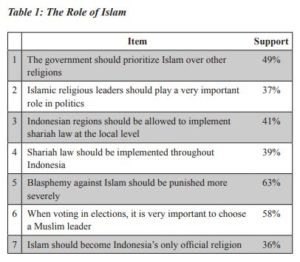There have been many signs that Indonesia has been experiencing rapidly increasing conservatism in recent years, such as the rising influence of Islamic hardliners on politics (like their successful campaign against former Jakarta Governor Basuki “Ahok” Tjahaja Purnama and the size of the recent anti-Myanmar protests). But how conservative are the views of your average Indonesian?
According to the ISEAS – Yusof Ishak Institute, a think tank studying socio-political, security and economic trends in Southeast Asia, the recently published results of a survey that shows a significant percentage of Indonesian Muslims holding views that could be considered strongly conservative.
Polling for the “Indonesia National Survey Project: Economy, Society and Politics” (INSP) took place from May 20-30 and was conducted across all 34 Indonesian provinces (soon after the end of the Jakarta gubernatorial election). Muslims constitute 86.2% of the sample size (in line with a 2011 consensus that put it at 87.2%).
Those who identified as Muslim were asked questions about the role of Islam in their everyday lives. “To the question of whether there will be any benefits to the implementation of shariah law, 90.9% agrees that there will be various benefits, while only 9.07% considers that ‘benefits would be very limited or null’.”
The new INSP survey results indicate the most popular reason for implementing shariah law, chosen by 67.2% of respondents, is that “shariah law would help strengthen moral values in society. The report argues this in Indonesia shariah law is perceived “not so much as the imposition of a certain socio-legal system, but as a measure for safeguarding moral values in society.”
Another finding noted by the report is that 82.1% of Muslims respondents agreed that all Muslim women should wear the hijab. “While the proportions differ very slightly where gender and location are concerned, those with low education (83.8%) and high education (88.9%) are more likely to agree that women should wear the hijab, and the lower the income of respondents, the more likely it is that they would agree that women should wear the hijab.”
On a series of other issues concerning the intersection of religious life and the public sphere, many conservative issues got weaker support but a majority agreed that “Blasphemy against Islam should be punished more severely” and “When voting in elections. it is very important to choose a Muslim leader.

ISEAS – Yusof Ishak Institute (ISEAS)
Data for the survey was gathered through face-to-face interviews with 1,620 adult Indonesian citizens using a multi-stage cluster sampling method to represent all provinces of Indonesia.
https://www.facebook.com/iseas.edu.sg/posts/10155067989538175




